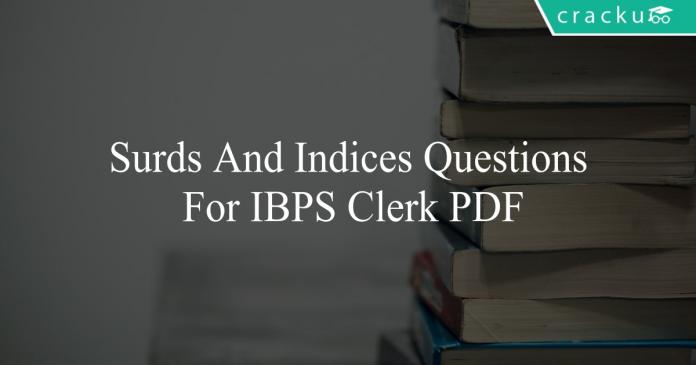Download important Surds and Indices Questions PDF based on previously asked questions in IBPS Clerk and other Banking Exams. Practice Surds and Indices Question and Answers for IBPS Clerk Exam.
Download surds And Indices Questions For IBPS Clerk PDF
105 IBPS Clerk for just Rs. 199
Take Free IBPS Clerk Mock Test
Download IBPS Clerk Previous papers PDF
Go to Free Banking Study Material (15,000 Solved Questions)
Question 1: If $log_3 2, log_3 (2^x – 5), log_3 (2^x – 7/2)$ are in arithmetic progression, then the value of x is equal to
a) 5
b) 4
c) 2
d) 3
Question 2: Let $u = ({\log_2 x})^2 – 6 {\log_2 x} + 12$ where x is a real number. Then the equation $x^u = 256$, has
a) no solution for x
b) exactly one solution for x
c) exactly two distinct solutions for x
d) exactly three distinct solutions for x
Question 3: If x = -0.5, then which of the following has the smallest value?
a) $2^{1/x}$
b) $1/x$
c) $1/x^2$
d) $2^x$
e) $1/\sqrt{-x}$
Question 4: Which among $2^{1/2}, 3^{1/3}, 4^{1/4}, 6^{1/6}$, and $12^{1/12}$ is the largest?
a) $2^{1/2}$
b) $3^{1/3}$
c) $4^{1/4}$
d) $6^{1/6}$
e) $12^{1/12}$
Question 5: If $log_y x = (a*log_z y) = (b*log_x z) = ab$, then which of the following pairs of values for (a, b) is not possible?
a) (-2, 1/2)
b) (1,1)
c) (0.4, 2.5)
d) ($\pi$, 1/ $\pi$)
e) (2,2)
Question 6: If x >= y and y > 1, then the value of the expression $log_x (x/y) + log_y (y/x)$ can never be
a) -1
b) -0.5
c) 0
d) 1
Question 7: If $f(x) = \log \frac{(1+x)}{(1-x)}$, then f(x) + f(y) is
a) $f(x+y)$
b) $f{\frac{(x+y)}{(1+xy)}}$
c) $(x+y)f{\frac{1}{(1+xy)}}$
d) $\frac{f(x)+f(y)}{(1+xy)}$
Question 8: $2^{73}-2^{72}-2^{71}$ is the same as
a) $2^{69}$
b) $2^{70}$
c) $2^{71}$
d) $2^{72}$
Question 9: Find the value of $\frac{1}{1 + \frac{1}{3-\frac{4}{2+\frac{1}{3-\frac{1}{2}}}}}$ + $\frac{3}{3 – \frac{4}{3+\frac{1}{2-\frac{1}{2}}}}$
a) $\frac{13}{7}$
b) $\frac{15}{7}$
c) $\frac{11}{21}$
d) $\frac{17 }{28}$
Question 10: If $\log_{2}{\log_{7}{(x^2 – x+37)}}$ = 1, then what could be the value of ‘x’?
a) 3
b) 5
c) 4
d) None of these
IBPS Clerk Important Questions PDF
Free Banking Study Material (15,000 Solved Questions)
Question 11: Which of the following is true?
a) $7^{(3^2)} = (7^3)^2$
b) $7^{(3^2)} > (7^3)^2$
c) $7^{(3^2)} < (7^3)^2$
d) None of these
Question 12: If $\log_{2}{x}.\log_{\frac{x}{64}}{2}=\log_{\frac{x}{16}}{2}$. Then x is
a) 2
b) 4
c) 16
d) 12
Question 13: What is the value of $\sqrt{\frac{a}{b}}$, If $\log_{4}\log_{4}4^{a-b}=2\log_{4}(\sqrt{a}-\sqrt{b})+1$
a) -5/3
b) 2
c) 5/3
d) 1
Question 14: $\log_{5}{2}$ is
a) An integer
b) A rational number
c) A prime number
d) An irrational number
Question 15: Find the coefficient of $x^{12}$ in the expansion of $(1 – x^{6})^{4}(1 – x)^{-4}$
a) 113
b) 119
c) 125
d) 132
Question 16: $(\sqrt{\frac{225}{729}}-\sqrt{\frac{25}{144}})\div\sqrt{\frac{16}{81}}=?$
a) $\frac{5}{16}$
b) $\frac{7}{12}$
c) $\frac{3}{8}$
d) None of these
Question 17: Find the value of x from the following equation:
$\log_{10}{3}+\log_{10}(4x+1)=\log_{10}(x+1)+1$
a) 2/7
b) 7/2
c) 9/2
d) None of the above
Question 18: If $\log{3}, log(3^{x} – 2)$ and $log (3^{x}+ 4)$ are in arithmetic progression, then x is equal to
a) $\frac{8}{3}$
b) $\log_{3}{8}$
c) $\log_{2}{3}$
d) $8$
Question 19: The value of $\sqrt{7+\sqrt{7-\sqrt{7+\sqrt{7-…..\infty}}}}$ is
a) 1
b) 2
c) 3
d) 4
Question 20: The unit digit in the product of $(8267)^{153} \times (341)^{72}$ is
a) 1
b) 2
c) 7
d) 9
Daily Free Banking Online Tests
Answers & Solutions:
1) Answer (D)
$2 log (2^x – 5) = log 2 + log (2^x – 7/2)$
Let $2^x = t$
=> $(t-5)^2 = 2(t-7/2)$
=> $t^2 + 25 – 10t = 2t – 7$
=> $t^2 – 12t + 32 = 0$
=> t = 8, 4
Therefore, x = 2 or 3, but $2^x$ > 5, so x = 3
2) Answer (B)
$x^u = 256$
Taking log to the base 2 on both the sides,
$u * \log_{2}{x} = \log_{2}{256}$
=>$[({\log_2 x})^2 – 6 {\log_2 x} + 12] * \log_{2}{x} = 8$
$(log_2 x)^3 – 6(log_2 x)^2 + 12log_2 x = 8$
Let $log_2 x = t$
$t^3 – 6t^2 +12t – 8 = 0$
$(t-2)^3 = 0$
Therefore, $log_2 x = 2$
=> $x = 4$ is the only solution
Hence, option B is the correct answer.
3) Answer (B)
$2^p$ is always positive
$x^2$ is always non negative.
$1/\sqrt{-x}$ is always positive.
$\frac{1}{x}$ is negative when x is negative.
In this case, x is negative => $\frac{1}{x}$ is smallest.
4) Answer (B)
Make the power equal and compare the denominators.
$2^{1/2}$ can be written as $64^{1/12}$
$3^{1/3}$ can be written as $81^{1/12}$
$4^{1/4}$ can be written as $64^{1/12}$
$6^{1/6}$ can be written as $36^{1/12}$
Among these, $81^{1/12}$ is the greatest => $3^{1/3}$ is the greatest.
5) Answer (E)
$log_y x = ab$
$a*log_z y = ab$ => $log_z y = b$
$b*log_x z = ab$ => $log_x z = a$
$log_y x$ = $log_z y * log_x z$ => $log x/log y$ = $log y/log z * log z/log x$
=> $\frac{log x}{log y} = \frac{log y}{log x}$
=> $(log x)^2 = (log y)^2$
=> $log x = log y$ or $log x = -log y$
So, x = y or x = 1/y
So, ab = 1 or -1
Option 5) is not possible
6) Answer (D)
$log_x (x/y) + log_y (y/x)$ = $1 – log_x (y) + 1 – log_y (x)$
= $2 – (log_x y + 1/log_x y)$ <= 0 (Since $log_x y + 1/log_x y$ >= 2)
So, the value of the expression cannot be 1.
7) Answer (B)
If $f(x) = \log \frac{(1+x)}{(1-x)}$ then $f(y) = \log \frac{(1+y)}{(1-y)}$
Also Log (A*B)= Log A + Log B
f(x)+f(y) = $ \log \frac{(1+x)(1+y)}{(1-x)(1-y)}$ solving we get $\log { \frac{1+ \frac{(x+y)}{(1+xy)}}{1- \frac{(x+y)}{(1+xy)}}}$
Hence option B.
8) Answer (C)
$2^{71} (2^2 – 2^1 – 1)$
$2^{71} (4-2-1)$
$2^{71}$
9) Answer (B)
First term can be reduced to $\frac{33}{21}$ or $\frac{11}{7}$
And second term can be reduced to $\frac{16}{28}$ or $\frac{4}{7}$
Sum will be = $\frac{11}{7}$ + $\frac{4}{7}$ = $\frac{15}{7}$
10) Answer (C)
$\log_{2}{\log_{7}{(x^2 – x+37)}}$ = 1
$\log_{7}{(x^2 – x+37)}$ = $2$
$(x^2 – x+37)$ = $7^{2}$
Given eq. can be reduced to $x^2 – x + 37 = 49$
So x can be either -3 or 4.
11) Answer (B)
$7^{(3^2)} = 7^9$
$(7^3)^2 = 7^6$
So $7^{(3^2)} > (7^3)^2$
12) Answer (B)
$\log_{2}{x}.\log_{\frac{x}{64}}{2}=\log_{\frac{x}{16}}{2}$
i.e. $\frac{log{x}}{log{2}} * \frac{log_{2}}{log{x}-log{64}} = \frac{log{2}}{log{x}-log{16}}$
i.e. $\frac{log{x} * (log{x}-log{16})}{log{x}-log{64}}$ = $\log{2}$
let t = log x
Therefore, $\frac{t * (t-log{16})}{t-log{64}}$ = $\log{2}$
$t^2-4*log 2*t = t*log 2-6*(log 2)^2$
I.e. $t^2-5*log 2*t-6*(log 2)^2$ = 0
I.e. $t^2-3*log 2*t-2*log 2*t-6*(log 2)^2$ = 0
i.e. $t*(t-3*log 2)-2*log 2*(t-3*log 2)$ = 0
i.e $t=2*log 2$ or $t=3*log 2$
i.e $log x=log 4$ or $log x=log 8$
therefore $x=4$ or $8$
therefore our answer is option ‘B’
13) Answer (C)
$\sqrt{\frac{a}{b}}$, If $\log_{4}\log_{4}4^{a-b}=2\log_{4}(\sqrt{a}-\sqrt{b})+\log_{4}{4}$
i.e. $\log_{4}\log_{4}4^{a-b}=\log_{4}((\sqrt{a}-\sqrt{b})^2)*4$
i.e. $\log_{4}4^{a-b}=((\sqrt{a}-\sqrt{b})^2)*4$
i.e. (a-b)*$\log_{4}4=((\sqrt{a}-\sqrt{b})^2)*4$
i.e. a-b = 4a+4b-8$\sqrt{ab}$
i.e. 3a + 5b – 8$\sqrt{ab}$ = 0
i.e. $3\sqrt\frac{a}{b}^2$ – 8$\sqrt\frac{a}{b}$+5 = 0
put $\sqrt\frac{a}{b}$ = t
therefore 3$t^2$ – 8t + 5 = 0
solving we get t = 1 or t = $\frac{5}{3}$
i.e. $\sqrt\frac{a}{b}$ = 1 or $\frac{5}{3}$
but if $\sqrt\frac{a}{b}$ = 1 then a=b then $\log_{4}(\sqrt{a}-\sqrt{b})$ will become indefinite
Therefore $\sqrt\frac{a}{b}$ = $\frac{5}{3}$
Therefore our answer is option ‘C’
14) Answer (D)
Let $\log_{5}{2}$ = y
Let us assume $\log_{5}{2}$ is a rational number.
$\log_{5}{2}$ = p/q, where p and q are co primes.
5^(p/q)=2 => 5^p=2^q.
5^p=5*5*5*5*5*5*5………………p times
2^p=2*2*2*2*2*2*2………………q times
No value of p and q can satisfy the equation. Hence y is an irrational number.
15) Answer (C)
We can write $(1 – x^{6})^{4}$ = $4C0(1)^4(x^6)^0$ – $4C1(1)^3(x^6)^1$ + $4C2(1)^2(x^6)^2$ – $4C3(1)^1(x^6)^3$+ $4C4(1)^0(x^6)^4$
$\Rightarrow$ $(1 – x^{6})^{4}= (1-4x^6+6x^{12}-4x^{18}+x^{24})$
Therefore, we can say
$(1 – x^{6})^{4}(1 – x)^{-4}=(1-4x^6+6x^{12}-4x^{18}+x^{24})*(1 – x)^{-4}$
We have to find out coefficient of $x^{12}$, $x^6$, $x^0$ in $(1 – x)^{-4}$.
We can use binomial expansion for negative coefficients. Therefore, coefficient of $x^{12}$ in $(1 – x)^{-4}$
$\Rightarrow$ $\dfrac{(-4)*(-4-1)*(-4-2)* … *(-4-11)}{12!}$
$\Rightarrow$ $\dfrac{15!}{12!*3!}$
$\Rightarrow$ $\dfrac{15*14*13}{3*2*1}$
$\Rightarrow$ $455$
Similarly, coefficient of $x^6$ in $(1 – x)^{-4}$
$\Rightarrow$ $\dfrac{(-4)*(-4-1)*(-4-2)* … *(-4-5)}{6!}$
$\Rightarrow$ $\dfrac{9!}{6!*3!}$
$\Rightarrow$ $\dfrac{7*8*9}{3*2*1}$
$\Rightarrow$ $84$
Coefficient of $x^0$ in $(1 – x)^{-4}$ is 1.
Therefore, we can say that the coefficient of $x^{12}$ in the expansion of $(1 – x^{6})^{4}(1 – x)^{-4}$ = 455+(-4*84)+(1*6) = 125. Hence, option C is the correct answer.
Alternative Solution:
$(1-x^6)^4 = (1-x)^4(1+x+x^2+x^3+x^4+x^5)^4$
$\Rightarrow (1-x^6)^4(1-x)^{-4} = (1+x+x^2+x^3+x^4+x^5)^4$
Hence we need to find coeff of $x^{12}$ in $(1+x+x^2+x^3+x^4+x^5)^4$ = $(1+x+x^2+x^3+x^4+x^5)\times$$(1+x+x^2+x^3+x^4+x^5)\times$$(1+x+x^2+x^3+x^4+x^5)\times$$(1+x+x^2+x^3+x^4+x^5)$
This will be equal to number of integral solutions for a + b + c + d = 12, 0<=a,b,c,d<=4
a is the power of x from the first expression, b is the power of x
Lets find the set of values for (a,b,c,d)
(5,5,2,0) => Number of ways of arranging = 4!/2! = 12
(5,5,1,1) => Number of ways of arranging = 4!/(2!*2!) = 6
(5,4,3,0) => Number of ways of arranging = 4! = 24
(5,4,2,1) => Number of ways of arranging = 4! = 24
(5,3,2,2) => Number of ways of arranging = 4!/2! = 12
(5,3,3,1) => Number of ways of arranging = 4!/2! = 12
(4,4,4,0) => Number of ways of arranging = 4!/3! = 4
(4,4,3,1) => Number of ways of arranging = 4!/2! = 12
(4,4,2,2) => Number of ways of arranging = 4!/(2!*2!) = 6
(4,3,3,2) => Number of ways of arranging = 4!/2! = 12
(3,3,3,3) => Number of ways of arranging = 4!/4! = 1
Hence the coeff of $x^{12}$ = 24*2 + 12*5 + 6*2 + 4 + 1 = 125
16) Answer (A)
$(\sqrt{\frac{225}{729}}-\sqrt{\frac{25}{144}})\div\sqrt{\frac{16}{81}}=x$ This can be simplified as
$(\frac{15}{27}-\frac{5}{12})\div\frac{4}{9}=x$
$(\frac{5}{36})*\frac{9}{4}=x$
x=$\frac{5}{16}$. Hence, option A is the correct answer.
17) Answer (B)
$\log_{10}{3}+\log_{10}(4x+1)=\log_{10}(x+1)+1$ can be written as
$\log_{10}{3}+\log_{10}(4x+1)=\log_{10}(x+1)+\log_{10}{10}$
We know that $\log_{10}{a}+\log_{10}{b}=\log_{10}{ab}$
$\log_{10}{3*(4x+1)}=\log_{10}{(x+1)*10}$
$12x+3=10x+10$
$x=7/2$. Hence, option B is the correct answer.
18) Answer (B)
If $log{3}, log(3^{x} – 2)$ and $log (3^{x}+ 4)$ are in arithmetic progression
Then, $2*log(3^{x} – 2) = log{3}+log (3^{x}+ 4)$
Thus, $log{(3^{x} – 2)^2} = log{3(3^x+4)}$
Thus, $(3^{x} – 2)^2 = 3(3^x+4)$
=> $3^{2x} – 4*3^x +4 = 3*3^x + 12$
=> $3^{2x} – 7*3^x – 8 = 0$
=> $(3^x+1)*(3^x-8) = 0$
But $3^x+1 \neq 0$
Thus, $3^x = 8$
Hence, $x = log_{3}{8}$
Hence, option B is the correct answer.
19) Answer (C)
Let, $\sqrt{7+\sqrt{7-\sqrt{7+\sqrt{7-…..\infty}}}}$ = $x$
Thus, $\sqrt{7+\sqrt{7-x}}$ = $x$
=> $7+\sqrt{7-x} = x^2$
=> $7-x = (x^2-7)^2$
Putting options we get,
x=1 => 6$\neq(-6)^2$
x=2 => 5$\neq(-3)^2$
x=3 => 4=$(9-7)^2$
x=4 => 3$\neq(9)^2$
Hence, option C is the correct answer.
20) Answer (C)
The unit digit in the product of $(8267)^{153} \times (341)^{72}$ is the same as the unit digit in the product of $(7)^{153} \times (1)^{72}$
1 raised to anything is 1.
7 has a cyclicity of 4. Thus, $7^{153} = 7^1 = 7$
Hence, option C is the correct answer.
Highly Rated Free Preparation App for Banking Exams
We hope this Surds and Indices questions and answers for IBPS Clerk preparation will be helpful to you.





